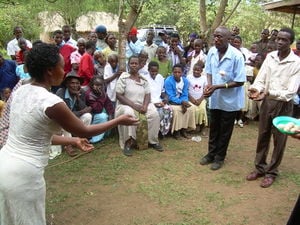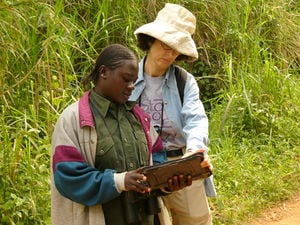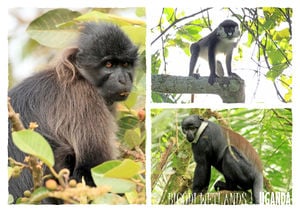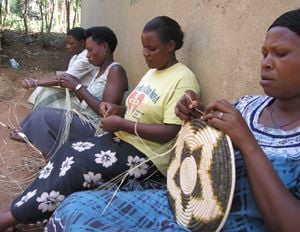
Kibale Association for Rural and Environmental Development (KAFRED) is a community-based organization in Western Uganda that aims to preserve the local environment "while advancing health, education and economic growth in the local community." KAFRED has won the Equator Prize in 2004 and 2010. Founded in 1992 by American Peace Corps Volunteer, Mark Noonan, and six community members, the organization uses ecotourism and other environmentally sustainable businesses that promote the conservation of biological diversity and development of the local community within the Bigodi Wetlands Sanctuary. [4].[1] [5].[2] Tourism is considered Uganda's second most important export after coffee. The Uganda Tourism Board lists Ecotourism as the "Featured activity" on their site, Tourism Uganda. [6][3] [7][4]

KAFRED's specific goals: [8].[6]
- Increasing household income and standards of living.
- Decreasing soil and water contamination.
- Creating an alluring environment for tourism.
- Spreading conservation awareness in the community.
- Developing community projects, such as schools.
- Reducing swamps/wetlands encroachment.
- Increasing the number of tourists and amount of income.
- Reducing animal-human conflicts.
Biodiversity Impacts

Uganda's unstable legal regimes up until 1986 lead to a number of problems (in all of Uganda) including:[7]
- Draining of wetlands due to land use, especially for dairy farming.
- Introduction of non-indigenous crops, such as rice, which have spread to a number of wetlands resulting in the loss of biodiversity and other wetland functions.
- Pollution, especially from copper mining activities, has affected wetlands in Western Uganda.
- Depletion of forests, animal species and other resources due to over-harvesting.
In 1995, a meeting including KAFRED members, heads of households bordering the wetlands, women leaders, local council representatives, district officials and facilitators from the National Wetlands Program (NWP) and the Kibale and Semliki Conservation and Development Project (KSCDP) was held to help establish village by-laws governing the use of Bigodi Wetlands. These crucial by-laws implemented how close human activities can partake to the swamp's edge. It also regulated firewood collection, grazing practices, and fruit gathering, in addition to banning digging trenches to drain the wetlands and burning within conserved areas. [9].[8]
The Makerere University Biological Field Station and KAFRED are working together to conduct research on various primate species including the Black and White Colobus, Red Colobus, Baboon, Grey Cheeked Mangabey, Red Tailed Monkey, Blue and Vervet Monkeys, and L'Hoest's Monkey. KAFRED is currently assessing possible impacts on primate numbers by counting these species within tourist trail areas. There are also over 200 bird species that inhabit the Bigodi swamp, including the rare Great Blue Turaco which KAFRED has dubbed as their logo. [10].[9]
Socioeconomic Impacts


Revenues made from tourism and other means are spent on community projects such as education, health and sanitation. KAFRED hires primarily from within the local community except in cases where there is need for a specific skill. KAFRED has hired 14 teachers, 6 guides, 2 cooks, 2 security guards and 3 cleaners. Teachers and guides receive training through both KAFRED and Makerere University. The Bigodi Women's Group and Peanut Butter group sell their goods through KAFRED at the Wetlands Visitor Center. Locals can afford to buy a wider variety of local grown food thanks to the high demand brought on with the influx of tourists, leading to a healthier diet. The number of permanent houses has increased from two in 1992 to over 20 today. KAFRED has gone from hosting 1000 visitors in the '90s to 3,500 in 2008. What most people consider to be the most notable achievement, however, is the construction and management of the Bigodi Secondary School. Prior to the Bigodi Secondary School, the nearest secondary school was in Fort Portal. There are only two buses per day and if you missed them then that meant a seven hour walk home. [11].[12] [12].[13] [13][14]
References
- ↑ Kibale Association for Rural and Environmental Development (KAFRED): Equator Initiative Case Studies
- ↑ Bigodi Wetlands Sanctuary & Women's Group
- ↑ Pro-Poor Tourism
- ↑ Tourism Uganda
- ↑ Bigodi Wetlands Sanctuary & Women's Group
- ↑ Bigodi Wetlands Sanctuary & Women's Group
- ↑ Ntambirweki
- ↑ Kibale Association for Rural and Environmental Development (KAFRED): Equator Initiative Case Studies
- ↑ Kibale Association for Rural and Environmental Development (KAFRED): Equator Initiative Case Studies
- ↑ Bigodi Wetlands Sanctuary & Women's Group
- ↑ Bigodi Wetlands Sanctuary & Women's Group
- ↑ Kibale Association for Rural and Environmental Development (KAFRED): Equator Initiative Case Studies
- ↑ Bigodi Wetlands Sanctuary & Women's Group
- ↑ The Great Primate Handshake
Lamptey, Edayatu Abieodun, et al. "Kibale Association for Rural and Environmental Development (KAFRED): Equator Initiative Case Studies." United Nations Development Programme: Equator Initiative. 2012. Web. 25 March 2013.
[15] Bigodi Wetlands Sanctuary & Women's Group. 2012. Web. 25 March 2013.
[16] Uganda Tourism Board. Tourism Uganda. 2013. Web. 25 March 2013.
[17] Holland, Jenny, Louise Dixey and Michael Burian. "Tourism in Poor Rural Areas: Diversifying the Product and Expanding the Benefits in Rural Uganda and The Czech Republic." Pro-Poor Tourism. Jan. 2003. Web. 30 March 2013.
Ntambirweki, John. "The Evolution of Policy and Legislation on Wetlands in Uganda." Makerere University. 4 July 1998. Web. 30 March 2013.
[18] "KAFRED." The Great Primate Handshake. 2009. Web. 30 March 2013.